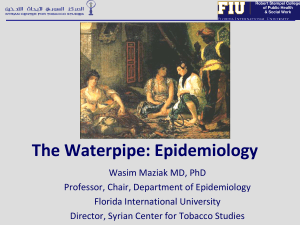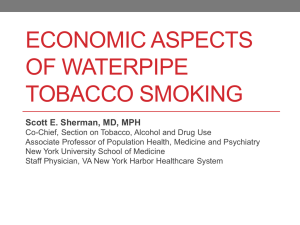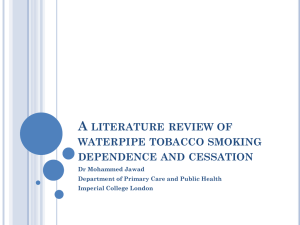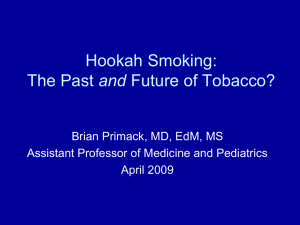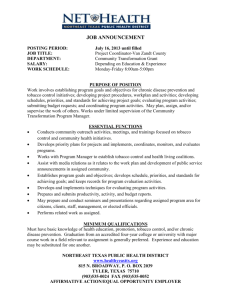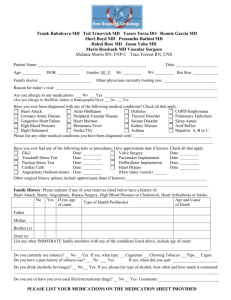Waterpripe industry products and marketing strategies: analysis of
advertisement
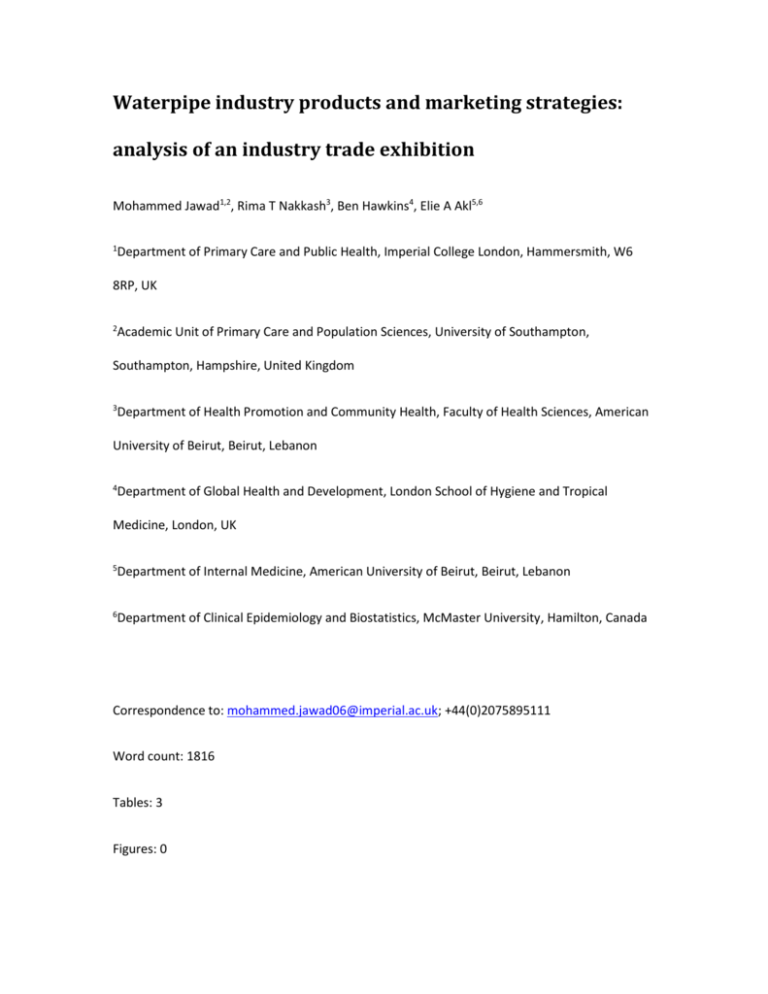
Waterpipe industry products and marketing strategies: analysis of an industry trade exhibition Mohammed Jawad1,2, Rima T Nakkash3, Ben Hawkins4, Elie A Akl5,6 1 Department of Primary Care and Public Health, Imperial College London, Hammersmith, W6 8RP, UK 2 Academic Unit of Primary Care and Population Sciences, University of Southampton, Southampton, Hampshire, United Kingdom 3 Department of Health Promotion and Community Health, Faculty of Health Sciences, American University of Beirut, Beirut, Lebanon 4 Department of Global Health and Development, London School of Hygiene and Tropical Medicine, London, UK 5 Department of Internal Medicine, American University of Beirut, Beirut, Lebanon 6 Department of Clinical Epidemiology and Biostatistics, McMaster University, Hamilton, Canada Correspondence to: mohammed.jawad06@imperial.ac.uk; +44(0)2075895111 Word count: 1816 Tables: 3 Figures: 0 Keywords: waterpipe, industry, marketing, products ABSTRACT Introduction Understanding product development and marketing strategies of transnational tobacco companies (TTCs) has been of vital importance in developing effective tobacco control policy. However, comparatively little is known of the waterpipe tobacco industry, which TTCs have recently entered. This study aimed to gain an understanding of waterpipe tobacco products and marketing strategies by visiting a waterpipe trade exhibition. Methods In April 2014 the first author attended an international waterpipe trade exhibition, recording descriptions of products and collecting all available marketing items. We described the purpose and function of all products, and performed a thematic analysis of messages in marketing material. Results We classified waterpipe products into four categories and noted product variation within categories. Electronic waterpipe products (which mimic electronic cigarettes) rarely appeared on waterpipe tobacco marketing material, but were displayed just as widely. Claims of reduced harm, safety and quality were paramount on marketing materials, regardless of whether they were promoting consumption products (tobacco, tobacco-substitutes), electronic waterpipes or accessories. Conclusions Waterpipe products are diverse in nature and are marketed as healthy and safe products. Furthermore, the development of electronic waterpipe products appear to be closely connected with the electronic cigarette industry, rather than the waterpipe tobacco manufacturers. Tobacco control policy must evolve to take account of the vast and expanding array of waterpipe products, and potentially also charcoal products developed for waterpipe smokers. We recommend tobacco-substitutes be classified as tobacco products. Continued surveillance of the waterpipe industry is warranted. WHAT THIS PAPER ADDS What is already known on the subject: Understanding the modus operandi of cigarette companies, especially product development and marketing strategies, can inform tobacco control policy; One cigarette company recently purchased the second largest waterpipe tobacco company; Waterpipe prevalence is growing worldwide and their industry products are generally non-compliant with tobacco control policy. What important gaps in knowledge exist on this topic: Little is known about the products and marketing strategies of the waterpipe tobacco industry; There is a lack of understanding about effective waterpipe tobacco interventions and policy regimes; What this study adds: We are able to categorise waterpipe products and hypothesise that electronic waterpipe products are highly similar to electronic cigarettes, with manufacturers closely connected to electronic cigarette industry; We show that claims of reduced harm are present on marketing material across tobacco, tobacco-substitute, electronic and charcoal companies. INTRODUCTION Little is known about product development and marketing strategies of the waterpipe (shisha, narghile, hookah) tobacco industry. This is disconcerting considering current prevalence is over 20% among 13-15 year olds in Lebanon, the West Bank, Estonia and Latvia[1]. Although the industry is still in its infancy, London has an estimated 400 waterpipe-serving premises[2]. A Lebanese study identified that waterpipe industry products are non-compliant with health warning label and advertising requirements of the WHO FCTC[3] [4]. Questions about the waterpipe industry strategy are warranted considering the recent investment by TTCs (e.g. Japan Tobacco International) in both the waterpipe sector[5] and related industries, including electronic cigarettes (e-cigarettes)[6, 7]. The 1st International Hookah Fair took place in April 2013, and was visited by over 4,000 delegates worldwide. The fair aimed to give “an overview of the great diversity that waterpipes can nowadays offer” and “to develop both business and private contacts”[8]. In April 2014 MJ visited the two day ‘2nd International Hookah Fair’[8] in Germany.. Open to the general public, it attracted 7,133 delegates worldwide, and intended to facilitate business-to-business and business-to-customer trade. This second iteration included a ‘vapour fair’; a trade exhibition for electronic cigarettes. This article documents the product range and marketing strategies from this fair. METHODS Sample Our sample included all exhibitors displaying waterpipe smoking products and related accessories, to whom the researcher introduced himself as a student writing a dissertation on the waterpipe industry. Data collection We sequentially attended each exhibition stand, recording information by observation, collection and discussion. Without a priori product selection criteria, we first ascertained the purpose and function of each waterpipe product through dialogue with exhibitors. Informed consent was not sought in order to protect the researcher from unknown threats of disclosure as a tobacco control researcher. No covert audio/video recording took place and field notes contained no identifiable data. Second, we asked for and collected all available marketing materials. This study was approved by the Imperial College Research Ethics Committee. Data analysis We categorised product data as follows: waterpipe consumption products (tobacco, tobaccosubstitutes), waterpipe accessories (apparatuses, charcoals, other), electronic waterpipes, and other products. We classified ‘e-liquids’, the substance found in e-cigarettes[9] under “other products”. We described each products’ purpose and function. Using the product categorisation scheme we conducted a content analysis on each marketing item, recording the main product advertised, as well as any other products. One researcher thematically analysed all marketing items using Braun’s six phases[10]. We took a theoretical perspective deductively from studies reporting on e-cigarette and waterpipe advertisements[11, 12]. We appropriately weighted contradictory data against the majority message. RESULTS Setting The fair was divided into three areas: the hookah fair (ground floor), shisha lounge (first floor) and vapour fair (second floor). A promotional video was posted shortly after the fair [13]. There were 43 exhibitors in the hookah fair and 54 in the vapour fair. Delegates sampled products in the shisha lounge. Waterpipe consumption products Tobacco All brands were flavoured, and sold either as prepared (tobacco mixed with molasses) or unprepared tobacco (loose/dry containers of tobacco with bottles of molasses sold separately). Both types of waterpipe tobacco are used in the same way; packed into the head of the smoking apparatus and covered with pierced aluminium foil. Tobacco-substitutes All brands were flavoured, claiming to contain no tobacco and encompassing different types of product. These included ‘steam stones’ (flavoured synthetic stones[14]), ‘shisha fruits’ (chemically processed pieces of fruit[15]) and ‘hookah gels’ (flavoured paste[16]). Waterpipe tobacco-substitutes were used in the same way as waterpipe tobacco. Waterpipe accessories Apparatuses These greatly differed in size (18 to 78 centimetres in height) and decoration. The number of possible hose attachments ranged from one to four. Several expensive, ‘limited edition’ apparatuses, made specifically for the exhibition, were on display. Charcoals Three main types of charcoal included ordinary charcoal briquettes, charcoals briquettes made from coconut shell or bamboo, and quick-lighting charcoal discs. All three types were intended to be ignited and placed above pierced aluminium foil in waterpipe apparatuses to heat the underlying tobacco. Other Other waterpipe accessories included a range of charcoal ignition devices (small grills), plastic containers filled with packets of ice which surround a portion of the hose in order to cool down the smoke, and “harm reduction” products such as disposable waterpipe hoses and mouthpiece filters. Electronic waterpipes These could be classified into five sub-categories based on Table 1. Electrically-heated ceramic waterpipe heads replace charcoal as the heating element, and the waterpipe is used in the conventional way. Electronic waterpipe heads serve to replace both the charcoal and tobacco by using e-liquids. No water is used in the base of the apparatus. The technology used is similar to e-cigarettes, that is, they use cartomisers (components containing a cartridge to hold e-liquids), and an atomiser to vaporise the e-liquid. Electronic waterpipe apparatuses contain an e-cigarette-like device at the end of the hose, powered by a battery inside the apparatus or an external power source. Vapour is generated from the end of the hose, as opposed to from the head of the apparatus in an electronic waterpipe head. ‘Shisha pens’ appear and function identically to e-cigarettes, except the liquids used in them generally do not contain nicotine. ‘Shisha hoses’ are larger devices, approximately 12 inches in length, which work in a similar way. ‘Shisha hoses’ are available in both disposable and refillable product variants. Other products Other products found at the exhibition included e-liquids, flavoured cigarettes, flavoured rollyour-own tobacco, cigarette papers (not sold in conjunction with waterpipe products), and bongs (glass devices similar to a waterpipe apparatus, used for recreational drug use). Marketing items Characteristics of marketing items Thirty six exhibitors distributed 52 unique waterpipe-specific marketing items advertising a total of 95 products. The language of marketing items were English only (n=20, 38.5%), mixed English/German (n=15, 28.8%) and German only (n=11, 21.1%). The remainder were in English/Italian/Spanish (n=2), Arabic/English (n=1), Arabic/German (n=1), Dutch/English (n=1) and Arabic/English/German (n=1). Over half of the marketing items were from exhibitors based in Germany (n=29, 55.8%), the remainder from elsewhere in Europe (n=10, 19.2%), the Middle East (n=4, 7.7%), Asia (n=3, 5.8%) and the USA (n=2, 3.8%). The remaining four items (7.7%) had no clear country of origin. References to a website were found on most (n=47, 90.4%) items and links to social media were found on 34.6% (n=18) of items. Ninety five products were found on 52 marketing items (Table 2). Most marketing items contained only one (n=25, 48.1%) or two (n=18, 34.6%) advertised products. Of 13 ‘other products’ found on marketing items these included e-cigarettes or e-liquids (n=6), bongs (n=3), car accessories (n=1) and candles (n=1). Only 2 (3.8%) of the marketing items had a health warning reference: one on an advertised tobacco product, and the other as a small-print text warning at the foot of an A4 flyer. With the exception of one catalogue from a distributor, no marketing material included both electronic waterpipe products and waterpipe tobacco products. Thematic analysis Fourteen themes were identified and 169 incidences of these themes were coded in 52 marketing items (see Table 3). The most common themes were describing waterpipe as a healthier alternative (n=35, 20.7%), describing its flavours (n=30, 17.8%), describing aspects of safety and quality (n=21, 12.4%) and describing its smell, taste and cleanliness (n=18, 10.7%). Vague references to waterpipe as a healthier alternative were consistent between and within product categories (see Box 1), although the comparator product was not specified, begging the question: healthier than what? Both electronic waterpipe companies and waterpipe tobaccosubstitute companies substantiated their health claims by comparing their product to waterpipe tobacco products. Charcoal companies that sold coconut shell or bamboo briquettes regularly claimed their product was healthier than traditional charcoal briquettes or quick-lighting charcoal discs. DISCUSSION This study gives insight into the rapidly evolving range of waterpipe industry products, and their associated marketing messages. Waterpipe consumption products, accessories and electronic waterpipe products all promoted harm reduction claims, despite evidence of a harmful toxicological profile of tobacco-substitutes[17, 18] and charcoal types[19]. Electronic waterpipe products and waterpipe tobacco products were rarely placed together on the same marketing item. We hypothesise that waterpipe tobacco companies either do not produce electronic waterpipe products, or choose to brand and market them distinctly. Given the similarities, the growing electronic waterpipe market may instead be thought of as an offshoot of the e-cigarette industry. Implications for policy Health policy makers should be aware of the expanding range of waterpipe products available, which should be classified in order to facilitate effective legislation. We recommend that electronic waterpipe products containing e-cigarette-like technology should be classified as electronic nicotine delivery systems (ENDS) as opposed to waterpipe tobacco products. The marketing of electronic products as waterpipes may be a marketing tactic to promote ecigarette devices to a different audience, or to create confusion in current policy debates as each would require a different regulatory framework due to how and where it is smoked and by whom (for example youth, disadvantaged populations). We recommend that waterpipe tobacco-substitutes be classified as tobacco products due to the known chemical composition of smoke it produces [17, 18], the fact they are marketed alongside tobacco products, and observations that products claiming to be tobacco-substitutes may nevertheless contain tobacco[2, 17]. This echoes similar calls for paan and paan masala (local forms of chewed tobacco inherent to south Asia) to be considered smokeless tobacco products, even if they do not contain tobacco[20]. Considering the marketing claims of charcoal companies may directly promote the use of tobacco, these should also be addressed in a regulatory framework. Implications for research The array of products between and within categories may complicate tobacco surveillance. For example, participants completing tobacco surveys may confuse ‘shisha pens’ (an e-cigarette) with ‘shisha’ (traditional waterpipe). Validated survey questions must make these differences clear. More research about the waterpipe tobacco and electronic waterpipe industries is warranted, including studies of its structure, ownership and effects of its expansion in terms of the larger tobacco product universe. Additional research may seek to contextualise current entreaties by the tobacco industry into the waterpipe market by examining their historical interest in this field. The Legacy Tobacco documents library is valuable for examining past developments in this area. Strengths and limitations To our knowledge this is the first study to provide insight into a waterpipe trade exhibition. We systematically collected product information and marketing items, and analysed them using a methodological framework consistent with previous studies. As a descriptive, thematic study with a limited sample coded by one researcher, no generalizable conclusions can be drawn. Due to the exploratory, time- and resource-constrained nature of the study we did not calculate product frequencies and instead relied on researcher observations Conclusions This trade exhibition featured a range of waterpipe products, mainly marketed as healthy and safe. Electronic waterpipe products should be considered as part of the wider e-cigarette category, not as part of the waterpipe industry. Policymakers should develop a robust legal framework addressing waterpipe. ACKNOWLEDGEMENTS Dr. Hawkins' research was partially supported by the National Cancer Institute of the National Institutes of Health under award number R01CA091021. The content is solely the responsibility of the authors and does not necessarily represent the official views of the National Institutes of Health. CONFLICTS OF INTEREST None FUNDING This study was funded by the Clinical Research Institute at the American University of Beirut. AUTHOR CONTRIBUTION MJ, EAA and RN conceptualised the study and drafted the study protocol. MJ collected data. MJ and BH performed data analysis. MJ wrote the first draft of the manuscript. All authors read and approved the final version of the manuscript. REFERENCES 1. Jawad M, Lee JT, Millett C. Waterpipe tobacco smoking prevalence and correlates in 25 Eastern Mediterranean and Eastern European countries: cross-sectional analysis of the Global Youth Tobacco Survey. Nicotine Tob Res. 2015 2. Jawad M. Legislation enforcement of the waterpipe tobacco industry: a qualitative analysis of the London experience. Nicotine Tob Res. 2014;16(7):1000-8 3. Nakkash R, Khalil J. Health warning labelling practices on narghile (shisha, hookah) waterpipe tobacco products and related accessories. Tob Control. 2010;19(3):235-9 4. Khalil J, Heath RL, Nakkash RT, et al. The tobacco health nexus? Health messages in narghile advertisements. Tob Control. 2009;18(5):420-1 5. Jawad M. Japan Tobacco Inc expands into shisha. Tobacco Control. 2013;22:81 6. Gara T. More E-Cigarettes in the Hands of Big Tobacco. The Wall Street Journal [online] Available at: http://blogs.wsj.com/corporate-intelligence/2014/02/03/more-e-cigarettes-in-thehands-of-big-tobacco/ [Date of access 15 January 2015]. 2014 7. Tobacco Tactics. E-cigarettes [online]. Available at: http://www.tobaccotactics.org/index.php/E-cigarettes [Date of access 22 January 2015]. 2014 8. Projekt20drei10. Exhibitor Info [online] Available at: http://hookahfair.com/index.php/en/exhibitor-info/exhibitor-info [Date of access 13 January 2015]. 2014 9. Etter J-F, Zäther E, Svensson S. Analysis of refill liquids for electronic cigarettes. Addiction. 2013;108(9):1671-9 10. Braun V, Clarke V. Using thematic analysis in psychology. Qual Res Psychol. 2006;3(2):77101 11. Andrade Md, Hastings G, Angus K. Promotion of electronic cigarettes: tobacco marketing reinvented? BMJ. 2013;347:f7473 12. Sterling KL, Fryer CS, Majeed B, et al. Promotion of waterpipe tobacco use, its variants and accessories in young adult newspapers: a content analysis of message portrayal. Health Educ Res. 2015;30(1):152-61 13. YouTube. ShishaMesse | HookahFair | VaporFair - 2014 HQ [online]. Available at: https://www.youtube.com/watch?v=jziWu-Vsrz8 [Date of access 22 January 2015]. 2014 14. Shiazo. Shiazo: The original steam stones [online]. Available at: http://www.shiazo.com. [Date of access 22 January 2015]. 2015 15. Shishafruits. [online]. Available at: http://vaporfruits.com/ [Date of access 22 January 2015]. 2015 16. Hookah-Shisha.com. Beamer Hookah Gel Ice Drops - 50g Jar [online]. Available at: https://www.hookah-shisha.com/p-14578-beamer-hookah-gel-ice-drops.html [Date of access 22 January 2015]. 2015 17. Hammal F, Chappell A, Wild TC, et al. 'Herbal' but potentially hazardous: an analysis of the constituents and smoke emissions of tobacco-free waterpipe products and the air quality in the cafes where they are served. Tob Control. 2013 18. Shihadeh A, Salman R, Jaroudi E, et al. Does switching to a tobacco-free waterpipe product reduce toxicant intake? A crossover study comparing CO, NO, PAH, volatile aldehydes, "tar" and nicotine yields. Food Chem Toxicol. 2012;50(5):1494-8 19. Sepetdjian E, Saliba N, Shihadeh A. Carcinogenic PAH in waterpipe charcoal products. Food Chem Toxicol. 2010;48(11):3242-5 20. Mukherjea A, Modayil MV, Tong EK. Paan (pan) and paan (pan) masala should be considered tobacco products. Tob Control. 2014 Table 1: Electronic waterpipe products found at the 2nd International Hookah Fair, Frankfurt, April 2014 Product Electricallyheated ceramic waterpipe head Example image Uses eliquids Uses tobacco Affixed to a standard waterpipe apparatus Smoke travels through the whole apparatus Yes Similarity to electronic cigarettes Yes Uses water in the base of the apparatus Yes No Yes Yes No Yes No Yes The head of the apparatus uses a cartomiser Yes No Yes No No Yes No No N/A N/A Yes No No N/A N/A End of the hose appears identical to an electronic cigarette Appears identical to an electronic cigarette Appears identical to, but slightly larger (~12 inches) than an electronic cigarette 1 Electronic waterpipe head 2 Electronic waterpipe apparatus 3 Shisha pen 4 Shisha hose 5 1 No obvious similarity www.shishapalace.com; 2www.flickr.com; 3www.e-nargy.com; 4www.shisha-pen.net; 5www.shisha-center.com; [Date of access for all: 14 October 2014] Table 2: Products found on marketing material items collected at the 2nd International Hookah Fair, Frankfurt, April 2014 Electronic waterpipe Waterpipe tobacco Waterpipe apparatus Waterpipe tobacco substitute Waterpipe accessory Charcoal No main product Other product No product TOTAL Main product on marketing material n % 13 25.0 13 25.0 12 23.1 4 7.7 3 3 2 1 1 52 5.8 5.8 3.8 1.9 1.9 100.0 Found anywhere on marketing material N % 17 17.9 16 16.8 23 24.2 7 7.4 13 5 13 1 95 13.7 5.3 13.7 1.1 100.0 Table 3: Themes elicited from marketing material collected at the 2nd International Hookah Fair, Frankfurt, April 2014 Theme Healthier alternative Flavours n 35 30 % 20.7 17.8 Safety and quality 21 12.4 Smell, taste and cleanliness Industry development 18 10.7 13 7.7 Price 13 7.7 Pack and/or accessories 8 4.7 Sexual themes 8 4.7 Brand sharing 7 4.1 Smokefree legislation 4 2.4 Environment 4 2.4 Cosmetic appeal 3 1.8 Lifestyle 3 1.8 Celebrity 2 1.2 169 100.0 TOTAL Example (see Box 1) ““delicious taste, tempting flavours and thick smoke” (Al Bashayer, waterpipe tobacco company) “…its composition is safe for health. This is confirmed by the award of the International Certificate of the Ministry of Health, of the Republic of Poland.” (Carbopol, quick-lighting charcoal company) “Better taste & clouds than tobacco” (Beamer Hookah, waterpipe tobacco-substitute company) “The authentic patent-protected mouthpiece design, along with high-quality technology standards inside the e-hookah, guarantee best vapour experience” (XEO International, electronic waterpipe company) “No need to buy normal coal - this saves money as it works much quicker” (Electric Shisha, electronic waterpipe company) “The process of packaging goes through rigorous research and development” (Mahroosh, waterpipe tobacco company) Women in bikinis smoking waterpipe (Shiazo, waterpipe tobacco-substitutes company) Dud Shisha, Boost and Dutch Shisha all present on same item “Can be used legally indoors where traditional shishas cannot” (Diamond Mist, electronic waterpipe company) “…we take special care about the eco-friendliness of this product. It is made of 100% renewable resources with 0 chemical additives.” (Coco Green, charcoal company) “Every Nargilem™ hookah is a unique piece of art, with a hand-blown glass made in some of Europe’s finest glass manufacturers and a luxurious, massive metal stem.” (Nargilem, waterpipe apparatus company) “The lifestyle product for modern smokers.” (XEO, electronic waterpipe company) “Johnny Depp does it, along with other celebs like; Bradley Cooper, Leonardo DiCaprio, Stephen Dorff, Katherine Heigl, Cheryl Cole, Robert Pattinson, Kate Moss, Ron Wood, Charlie Sheen, Britney Spears, Paris Hilton, Lindsay Lohan, and others…” (XEO, electronic waterpipe company) Box 1: Waterpipe as a healthy product “…our goal is to have our patrons with not only the best but the healthiest forms of smoking hookah.” (Mahroosh, waterpipe tobacco company) “…it is possible to enjoy your shisha without tobacco and side effects like nicotine or tar…” (Shiazo, waterpipe tobacco-substitute company) “Besides the convenient usage and the health benefits there are many more advantages of using Shiazo as an alternative for tobacco.” (Shiazo, waterpipe tobacco-substitute company) “Shisha Fruit contains no tobacco and no nicotine and is therefore less harmful to use.” (Shisha Fruit, waterpipe tobacco-substitute company) ”The safer shisha experience.” (Diamond Mist, electronic waterpipe company) “less ash, no fumes, no smell, low emissions” (Tom Cococha, charcoal company) “does not contain any chemical substances like you would find them in quick lighting charcoal.” (Cocobrico, charcoal company)
